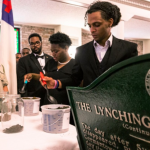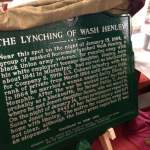What does it take to bring a past wrought with racism into the present, to provide truth and justice through unfiltered education? History tells us it is something you and I possess: courage.
A murder deserves justice whether it happened yesterday or more than 160 years ago. When we try, in the words of Ida B. Wells, to right wrongs by shining the light of truth on them, we begin to show the courage it takes to correct the transgressions of those who came before us.
On Jan. 1, 1851, a black man was lynched in Downtown Memphis after trying to escape from his enslavement. He had the courage to run away from the then-legal, yet unfair and violent life of slavery, but he was apprehended in Memphis trying to travel by ship up the Mississippi River to freedom in the North.
When his certificate of freedom was presented to the city’s registrar, John Chester, Chester declared it a forgery. In retaliation, the man killed Chester. About two hours after this man’s arrest, and without a trial, he was dragged from the jail at Market Square and hanged from the nearest tree.
Today, this man remains unidentified. At the time, his name was never provided to the press for identification. His race, gender and even the name of the man who owned him were all printed in more than 50 newspaper articles about his murder, published from Oregon to New York. However, his name was always excluded. After more than a year of research by the Lynching Sites Project of Memphis, his name still remains a mystery.
This research and the process of trying to discover his identity took courage from all kinds of people. Conservative, liberal, black, white, old, young, men and women cooperated towards the common goal of uncovering this lynching victim’s name. The pursuit of truth united us all.
Eighteen years later, on Jan. 15, 1869, a black man named Wash Henley was lynched for his part in running away with his white employer’s teenage daughter. A blacksmith by trade, he had served in the U.S. Colored Infantry during the Civil War with the rank of private from March 1864 until January 1866.
After the war he continued his trade under the employment of Philip T. Jones, where he met Jones’ daughter Susan when she was about 16. On the night of Jan. 14, newspapers reported, Susan Jones took $445 of her father’s money and left home with Henley. The motive for their running away was never determined. Although the local press reported it was an elopement, Henley was married to Emily Black of Memphis.
The day she and Henley went missing, Jones located his daughter in Germantown and took her back home. That same day six of Jones’ friends captured Henley. The friends were taking Henley back to Bartlett, intending to turn him over to authorities. However, a group of 25 masked horsemen intercepted them, forcibly took Henley, and lynched him. One newspaper reported that Henley was hanged and set afire before being shot. A coroner’s jury found that Henley was killed by pistol balls.
Wash Henley’s body was found on Jan. 16 near Fletcher’s Creek. There were no efforts to investigate, arrest or prosecute the lynchers. Henley’s burial site is still unknown. He was never provided the opportunity to explain his actions nor given a trial. He was granted no presumption of innocence. Again, this crime of the past brought all types of people together in the present, trying to uncover more about Henley.
On Oct. 19, 2019, at Collins Chapel CME Church at 678 Washington Ave., two historic markers will be dedicated: one, for the first documented lynching in Shelby County (1851); the other, for the lynching of Wash Henley (1869).
This is everyone’s past; it is everyone’s responsibility to make the future better. If it matters to you, please just show up. It takes courage to be uncomfortable with the truth of an unacceptable past, but you are not — and you will not be — alone. As you read this, the unjust murder of two black men more than 150 years ago is connecting us.
As humans and as Americans I believe we are motivated to find the facts of our past. In order to heal the wounds inflicted in those violent and racist events of our history, we must practice bravery while we seek justice today. We must authentically pursue past truth. We must demand an unfiltered education for our future. Only then will we be able to achieve the ideal that is America.
We’re grateful to the National Park Service and the Shelby County Historical Commission for their support and co-sponsorship. We all hope to see you on Saturday. We’ll begin at 10 a.m.








